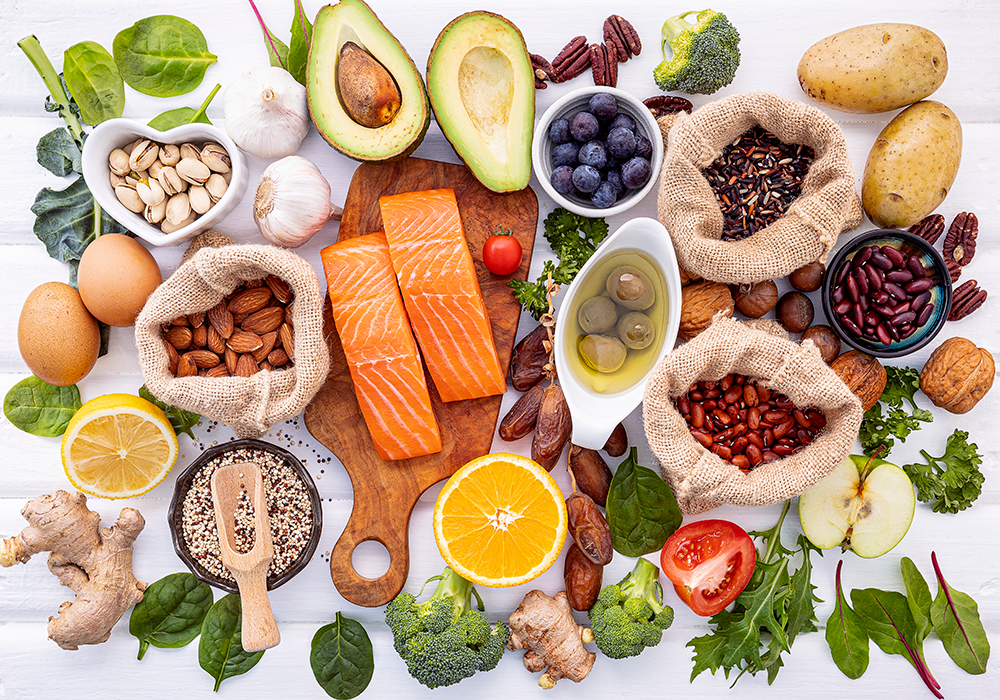Is it just me, or do you see collagen all over the place as well? At instagram feeds, at the grocery store, and even in the natural foods shop checkout aisle – the majority of which is, of course, in supplement form.
Aside from the fantastic and legitimate benefits, regular collagen supplements aren’t for everyone. They can also be quite expensive.
But you don’t need to spend money on trendy collagen products when you can get the same collagen advantages organically by making a well-informed trip to the supermarket.
Let’s get to know about collagen foods sources that you can include in your diet.
Table of Contents
What is Collagen?
Collagen, to put it simply, is the protein that holds the body together. This structural protein functions as a building block for your bones, teeth, muscles, skin, joints, and connective tissues, and is the most abundant protein in the human body.
It helps to maintain the appearance of smooth, supple skin and gives our bones and muscles power.
Some of the health benefits that you can get from collagen foods involve:
- Improved skin tone
- Firms skin
- Lessen appearance of wrinkles
- Restore collagen to the face
- Promote bone health
- Help build stronger muscles
- Increase antioxidant levels
Collagen Booster Foods
Now, let’s look at the list of collagen booster foods that you should include in your diet.
1- Bone Broth
One of the most well-known and popular sources of collagen is bone broth.
To get the benefits of bone broth, you can prepare it yourself by boiling beef, chicken, or other animal bones until all of the nutrients are extracted. That might take hours. However, if you don’t have patience for that, you can easily dash to the store to find ready made broth.
2- Meat
Collagen is found in a variety of protein-rich meats, including beef and chicken, because it is the most prevalent protein in animals.
Furthermore, because collagen is the principal component of bone and/or connective tissue, meat sources that include bone and/or connective tissue (such as chicken wings) are exceptionally high in collagen.
Adding more, chicken neck and cartilage has been used as a source of collagen for arthritis treatment in several trials.
3- Fish
Fish is another good choice as one of the collagen booster foods because it’s high in the amino acids needed to make collagen.
Also have you ever wondered why a fish’s skin is so smooth when the scales are removed? This is due to the high concentration of Type I collagen, which makes up the majority of skin collagen.
Drinking milk after fish: Is it safe or not? To learn that click here!
4- Citrus Fruit
Vitamin C is essential for the body’s manufacture of pro-collagen, which is the precursor of collagen. Getting adequate vitamin C is therefore crucial.
Citrus fruits like oranges, grapefruit, lemons, and limes are high in this vitamin, as you presumably already know.
5- Tomatoes
Tomatoes are also high in vitamin C, which might help your body produce more collagen. Add them to your favourite salad recipe or eat them raw with a dab of olive oil, salt, and pepper.
6- Red Bell Peppers
Moving next to collagen booster foods, red bell peppers are another choice. Red bell peppers are rich in vitamin C.
Of course, this isn’t a dig at our green and yellow variants. Red peppers are simply overripe green peppers, but yellow peppers fall halfway in between. Each one contains vitamin C. The red peppers, on the other hand, contain more vitamin C as they age, making them even more valuable for that collagen factory.
7- Leafy Greens
We all know that leafy greens are an important part of a balanced diet. They may also have cosmetic benefits.
How?
Chlorophyll, which is known for its antioxidant effects, is rich in spinach, kale, chard, and other salad greens. And certain research has demonstrated that ingesting chlorophyll boosts the precursor to collagen in the skin. And while we’re on the subject of vegetables, leafy greens are also a rich source of vitamin C.
8- Egg White
Although egg white doesn’t contain connective tissue, they have proline in abundance. Proline is an amino acid required for collagen synthesis.
9- Garlic
Garlic may also help you produce more collagen. Garlic is strong in sulphur, which is a trace mineral that helps synthesis and prevent the breakdown of collagen.
It’s crucial to remember, though, that how much you consume is important. Garlic is generally safe in moderate amounts, but too much garlic (particularly raw garlic) can induce heartburn, upset stomach, and raise your risk of bleeding if you take blood thinners.
So, if you’re looking to boost your collagen levels, don’t eat more garlic.
Get to know more about garlic benefits.
10- Nuts
Nuts are another choice for collagen booster foods. Nuts are high in zinc which is one of the trace minerals required for collagen synthesis. In addition, they’re also high in protein, a modest handful will keep you full for a long time.
Go ahead! Make nuts your new midnight snack if you’re into healthy munching.
11- Oysters
Oysters have the highest zinc content of any food. Three ounces of oysters provide 33 milligrams of zinc, which is three times the daily recommended zinc consumption. Oysters are also high in collagen-producing copper that can help you meet your body’s requirement of collagen.
